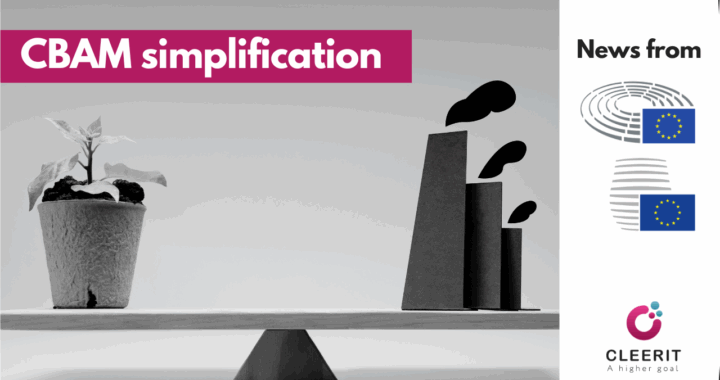On 29 September 2025 the European Council adopted a regulation that simplifies the EU’s carbon border adjustment mechanism (CBAM), as part of the ‘Omnibus I’ legislative package.
It was published 17 October 2025 as regulation (EU) 2025/2083 of the European Parliament and of the Council of 8 October 2025 amending Regulation (EU) 2023/956 as regards simplifying and strengthening the carbon border adjustment mechanism (Text with EEA relevance). The text can be found here: Regulation – EU – 2025/2083 – EN – EUR-Lex
The climate ambition behind the CBAM remains unchanged – about 99% of embedded emissions in the imported CBAM goods will remain covered.
Main elements of the regulation:
⭕ A new ‘de minimis’ mass threshold whereby imports up to 50 tonnes per importer per year will not be subject to CBAM rules.
The measure is expected to exempt mainly SMEs and individuals, which import small or negligible quantities of goods covered by the CBAM regulation.
⭕ Imports of CBAM goods will be allowed under several conditions pending CBAM registration of the importer, to avoid any disruptions for importers in the beginning of 2026.
⭕ The authorisation procedure, the data collection processes, the calculation of emissions, verification rules, and the financial liability calculation of authorised CBAM declarants have been simplified for all importers of CBAM goods.
⭕ The amended regulation contains adjustments of provisions on penalties and on the rules regarding indirect customs representatives.
ℹ️ The CBAM equalises the price of carbon between domestic products and imports and ensure that the EU’s climate objectives are not undermined by production relocating to countries with less ambitious policies.
It also helps reduce the risk of carbon leakage by encouraging producers in non-EU countries to green their production processes.
🌿 Background
The EU’s carbon border adjustment mechanism is the EU’s tool to equalise the price of carbon paid for EU products operating under the EU emissions trading system (ETS) with that of imported goods, and to encourage greater climate ambition in non-EU countries.
In early 2026, the Commission will assess whether to extend the scope of the CBAM to other ETS sectors and how to help exporters of CBAM products at risk of carbon leakage.
Source:
CBAM: Council signs off simplification to the EU carbon leakage instrument – Consilium
